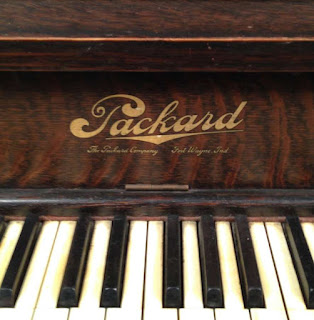The United Church of Underhill has three pianos: one in the basement that I did not see, a 1986 Yamaha console upright in the sanctuary, and an old Everett upright grand in the community room behind the altar. The console in the sanctuary, a gift made in memory of an active choir member by her family, is well-maintained and fairly responsive. The big old Everett, a monster from the heyday of the upright grand (roughly a century ago) is less cared-for but still quite stable. It sounds like it would hold a tuning well (it was in decent tune despite its relatively infrequent care) and has a beautiful, rich, evocative sound.
But the concert (#3, May 21, 2022) was on the Yamaha console. It was a good representative of its class, clear, consistent, and in tune. But I struggled to make dynamic contrasts, and the model’s short bass strings couldn’t do justice to the register. While this was sometimes frustrating, it also had paradoxical salutary effects.
Beethoven’s first sonata, dedicated to his sort-of teacher Haydn, is indeed Haydnesque in its lean proportions and thematic economy. But it already evinces the heroic, heaven-storming Beethoven, particularly in the furiously fast finale.
To put it bluntly, the requisite sounds for Beethoven’s heroic style just weren’t on this piano. In order to approximate the maniacal intensity and dynamic contrasts the piece cries out for, I had (again to be blunt) to play the living hell out of it. This required me to perform with real abandon—and the thing being abandoned was any care or concern about my own abilities. The result was perhaps not a rendition for the ages, but surprisingly strong. The audience was electrified, and my support team, who as musicians were aware of the piano’s limitations, told me they were listening with slack-jawed astonishment.
It reminded me of the time in grad school when I was learning Beethoven’s last sonata. I was practicing it on the Packard* in my basement apartment, one of those grand old uprights like the above-mentioned Everett. It had a big, rich sound, but not as big as demanded by late Beethoven in his full-on chest-beating Titan mode, as in the first movement of op. 111. My friend Justin Davidson, at the time not yet the esteemed music and architecture critic but just some guy with a good ear, opined that the piece sounded in some ways better than on a modern grand, because of how hard I had to struggle to make the piano roar.
He was right! This wasn’t merely a sentimental romantic conceit, the idea that it is vaguely ennobling to fight to push the machine past its limits. Rather, you play a certain way when you’re sending it, which is very different from how you play when you’re holding back. And Beethoven, even deaf as he was, understood that he was pushing the limits of the small, wood-framed pianos of his time, knew that the passagework and registral leaps and dynamic juxtapositions of his heroic style would require the pianist go all out. Whereas on a modern 9-foot concert grand, the piano simply does what the performer asks, and in places the situation Beethoven had in mind is even inverted: the pianist has to pull back or slow down to keep the piano from overpowering the music.
But right now, in light of my project to become a more present and giving performer, what interests me about this is how having to fight to overcome an instrument’s limitations pulls me out of ego-driven negative thinking into a much purer, more positive frame of mind. Instead of worrying if I am living up to the music, it puts me and Beethoven on the same team: we’re just struggling together to do the best we can with the imperfect instruments we’ve been given.
*No relation to the car company, though their logos are strikingly similar. I regret that the internet has made it so easy for me to ascertain their non-relation; back in grad school, pre-Google, I assumed the auto manufacturer and instrument maker were the same outfit. (Why not? It’s true for Yamaha and motorcycles.)
 |
